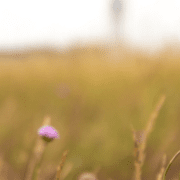Titelbild: Hummel Quelle: Flickr User Rabumms
Dave Goulson ist ein bekannter englischer Biologe, Autor mehrerer Bücher und Naturschützer. Sein bekanntestes Buch „Und sie fliegt doch. Eine kurze Geschichte der Hummel“ (2014, Hanser Verlag) wurde mehrmals ausgezeichnet und ist eine sehr spannende und humorvolle Lektüre über Hummeln. Goulson schafft es in seinen Büchern den LeserInnen die faszinierende Welt der etwas kleineren Lebewesen unseres Planeten näher zu bringen und zeigt wie wichtig auch der Schutz dieser Tiere ist.
Derzeit forscht und lehrt Dave Goulson an der Universität Sussex und hat bereits über 200 wissenschaftliche Artikel über die Ökologie von Bienen und anderen Insekten veröffentlicht.
Professor Dave Goulson war so freundlich und gab uns für das bioskop ein kleines Interview über seine Arbeit als Autor und die Rolle der Biologie in der heutigen Zeit:
What was your motivation to start writing popular science books?
I was keen to reach a broader audience. Scientific publications are read by only a handful of other scientists. My research is on wild bee declines, and what we can do to look after these vital creatures. If we are to ensure a future for our wild bees then we need to get lots of people involved in caring for them – that is my goal.
How do you manage to combine your scientific research and your work as an author?
For me, scientific research and writing go hand in hand with writing articles for a popular audience. If a scientist is not doing work of interest to the public, and is unable to explain to them why his work is important and interesting, then perhaps he is in the wrong profession. Of course, finding the time for both types of writing can be a challenge!
The futurologist John Naisbitt once wrote, that the 21st century will be the age of biology, would you agree?
I’m sure that there will be some amazing scientific advances in the biological area this century. However, my fear is that future generations will know the 21st century as the age of mass extinction, the period when most of life on Earth was lost, and when other vital resources such as soil were squandered, leaving our descendants to eke out their lives on a sad, grey, depleted planet.
Do you think, biologists have a special responsibility to save our ecosystem?
Of course, most biologists are painfully aware of the damage we are doing to our planet. Finding the solutions to the problems will certainly also require biologists. In particular, we need to devise ways to grow food that are truly sustainable.
What is your latest book about?
My new book, Bee Quest, is about my search to find and study the world’s most unusual and endangered bees. It tells their stories, but also I think gives some hope, for I finish with giving some examples of how remarkably resilient nature can be if only we give it the chance to recover.
Can we hope, to enjoy more books of you in the future?
I am currently working on a new book about the little creatures that live in our gardens, the insects, spiders, worms, and toads, and how best we can encourage them to thrive. Perhaps gardening can save the planet.
Thank you very much for the interview!
Ebenfalls im Hanser Verlag erschienene Bücher von Dave Goulson:
Wenn der Nagekäfer zweimal klopft. Das geheime Leben der Insekten (2016)
Die seltensten Bienen der Welt. Ein Reisebericht (2017)
Beide uneingeschränkt zu empfehlen.

 https://www.flickr.com/photos/mq_p/14566472492/in/photostream/
https://www.flickr.com/photos/mq_p/14566472492/in/photostream/